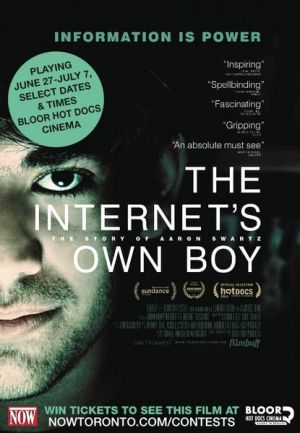
By Mallory Hellman
Most films, we view for entertainment. Some, we view to deepen our education. But behind certain films—a select and potent few—there lies a moral imperative so powerful as to make not watching them feel like a crime.
The Internet’s Own Boy, a 2014 biographical documentary directed by Brian Knappenberger, explores the story of Aaron Swartz, the contentious hacker/activist whose mission to make online information accessible to the public ultimately cost him his life.
Swartz’s story is, at its heart, one of atypical devotion. The child of white-collar professionals in an affluent Chicago suburb, Swartz became familiar with computers in the late 1980s. By 1996, he had taught himself the basics of web programming and invented an online Star Wars trivia game. Two years later, he used his technological prowess to build a programmable iMac costume for his younger brother to wear on Halloween. He filmed an accompanying tutorial video. He was eleven years old.
Not long after he became acquainted with the life of the Internet, Swartz began to combat its limitations. Years before Jimmy Wales founded Wikipedia, Aaron Swartz launched his own site called The Info, where users could publish articles about any topic of expertise, and others could tinker with the information as they saw fit. The program attracted national attention when it won the 2000 ArsDigita Prize, launching thirteen-year-old Swartz into the public eye.
That spotlight would shine on him for the rest of his life. Over the next decade, Aaron Swartz collaborated on and spearheaded several pivotal programming projects, from the invention of RSS feeds to the co-founding of Reddit. Ever at odds with institutionalized education, he dropped out of Stanford after only a year of study and moved to San Francisco to work for a programming start-up. But the Silicon Valley corporate life didn’t suit him either—during his first day on the job, Swartz locked himself in a bathroom stall and cried. He was fired a few weeks later for never showing up again.
But Swartz was still working. After encountering an appalling correlation between funding for pharmaceutical research and the funded studies’ results, he attempted to consult federal laws on the matter, only to find the acquisition of those documents a horribly costly process. Determined to quash the for-profit business of denying Americans access to the laws that govern them, Swartz became an advocate for public access. He moved to Cambridge on a Harvard fellowship and spent time regularly at MIT.
It was there that he committed the act that would permanently alter his life.
As a piece of art, Knappenberger’s documentary is seamless, providing windows into Swartz’s life and work from his parents, his siblings, his friends, and the extended family of self-proclaimed geeks who carried out his mission alongside him. Their tenderness for
this young man—and for the fierce dignity of the projects he pursued—shines like a beacon to anyone who’s ever wanted to effect change.
This film will make you angry. Angry that we’ve lost someone of such brilliant potential. Angry that we’re short one talented revolutionary. Angry that our so-called public channels of information remain muddied by corporate interest and institutional greed. And angry that in a country so ostensibly evolved, the quest to educate a people—to grant universal access to the fruits of our own intellectual labor—could be a crime that costs a life.
This isn’t an easy film to watch, but it’s most certainly an important one.
Aaron believed that you ought to be asking yourself at every moment, “What is the most important thing I could be working on in the world right now?” And if you’re not working on that, why aren’t you?
Sage words from a light lost too soon. He was one of the good guys.